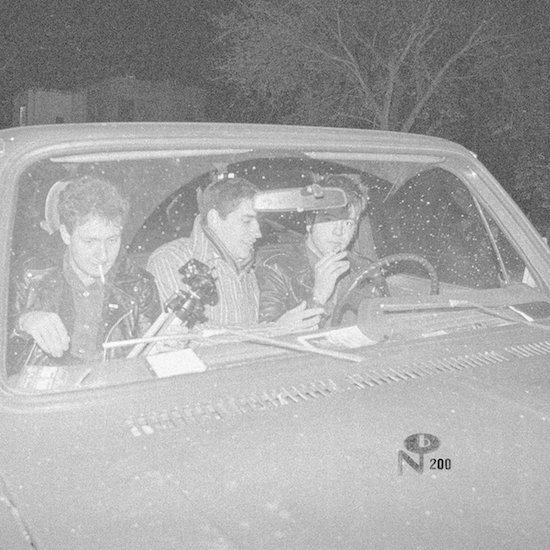Any archivist project is informed and stalked by mortality. Earlier this year, Hüsker Dü’s Grant Hart asked Numero Group label boss Ken Shipley, regarding Savage Young Dü, “Can you get it out before I go?” Hart died of liver cancer in September, a week after Numero formally announced this years-in-the-making boxset. Perhaps it’s self-evident – 56 is a dreadfully young age to check out, even for someone who drove his body like he stole it – but such a tragedy throws this kind of history-raking into sharp focus.
The content of Savage Young Dü isn’t the stuff with which Hart, plus bandmates Bob Mould and Greg Norton, altered the course of punk/hardcore/alternative rock/whatever else you want to pin on ’em: that came right after, starting with 1984’s transcendent Zen Arcade. It’s the signposts on the way there, raw data whose chaotic rage sometimes renders it as unintelligible as code you never learned. Starting in spring 1979 and finishing at Christmas 1982, the young – teenaged, at their inception – Hüsker Dü were prolific songwriters: of this collection’s 69 tracks, five songs are included in two versions and two more are covers.
The popular narrative about this trio – and ‘the Dü’ became, and remain, enough of a rock critic darling for there to be a popular narrative – paints them as a speed-guzzling faster-than-thou noisy hardcore band who grew up after a few years and started writing proper songs with proper tunes. This is a simplification, as a chronological walk through Savage Young Dü testifies. Their first ever recordings, ‘Do The Bee’ and ‘Nuclear Nightmare’, are raucous but not especially brutal ur-punk numbers, mainly notable for the early hints of Mould’s wall-of-shred guitar playing.
Other songs in the band’s pre-1980s canon are sweetly jejune in their subject matter. ‘You’re Too Obtuse’ is about unnamed music scene posers, presumably located in their adopted home city of Minneapolis; the protagonist of ‘Can’t See You Anymore’ approaches sex with pained awkwardness and ‘Do You Remember?’ (hüsker dü? in Danish or Norwegian) is defiant ageism a la ‘My Generation’. More notably from this crop, ‘Sore Eyes’ marries discord and melody with such panache, it would have fitted comfortably on Candy Apple Grey, the group’s major label debut of 1986.
Hüsker Dü’s next period – that of a band with purchasable product, debut 7-inch ‘Statues’ released in January 1981 – again contains multitudes. Blaring, paranoid postpunk with an insistent bassline by Norton, ‘Statues’ always reminded me of PiL, especially on the original close-on-nine-minute version (it was edited down to five for the format) that’s on the Everything Falls Apart And More CD. That same disc also dug up ‘Let’s Go Die’, a rare Norton composition whose tempo and punch encapsulates his band’s transition from punk to hardcore, and indeed the moment in time where distinctions between both were blurred.
This brings us to Land Speed Record, the result of their unusual decision to release a soundboard recording of a summer 81 gig as their debut LP – Savage Young Dü mimics it with a similar live set from around the same time. Their intensity in this era is the stuff of earnest gasps, probably amplified through being heard by people who don’t necessarily consume a lot of early US hardcore – but not only does this predate debut releases by the comparably nutso-sounding Void, Die Kreuzen, DRI and post-Dü Minneapolis bands like Mecht Mensch, it’s a landscape-mangling tornado of sound, each member sounding like they’re perma-soloing but locking together improbably. A 2016 quote from Hart, likening it to free jazz and Indian ragas, is by no means hifalutin. Subsequent studio efforts pinball from sweetness to hyperspeed like no other act of the time, save maybe for the Descendents: ‘In A Free Land’, lead cut on Hüsker Dü’s second 7-inch, is arguably where Mould’s oppressive, saturated quasi-psych guitar sound becomes its own, easily identifiable beast. ‘M.I.C.’ and ‘What Do I Want?’, its b-sides, are flailing hardcore wails lasting 77 and 67 seconds respectively.
Everything Falls Apart, the band’s final release before signing to the SST label, pulls further in both directions. ‘Punch Drunk’ and ‘Bricklayer’, both barely half a minute, still afford Mould a lightning solo moment. Ninety seconds later they’re covering Donovan’s ‘Sunshine Superman’ in fairly respectful fashion, then hitting a gorgeous proto-pop-punk melodic seam with the title track. The belligerence that marked their late-70s lyrics remains in ‘Target’ and ‘Obnoxious’ (“You can’t sell our product / Who asked you to?”) – Mould, Hart and Norton were all still in their early twenties, and by some stretch the gnarliest sound in town. Equally, by this point Hüsker Dü were already well on the way to doing incredible things.
Like most bumper collections of this nature, Savage Young Dü is not a starting point. Sensibly, one should swot up on Hüsker Dü’s complete 1984-86 output first, then dig into this box and its wealth of eyewitness anecdotes and photos of puppy-fattened band members. Historical context suitably delivered, toast the lifespan of a great rock band and burn one for the guy who didn’t see this release hit the shelves.


